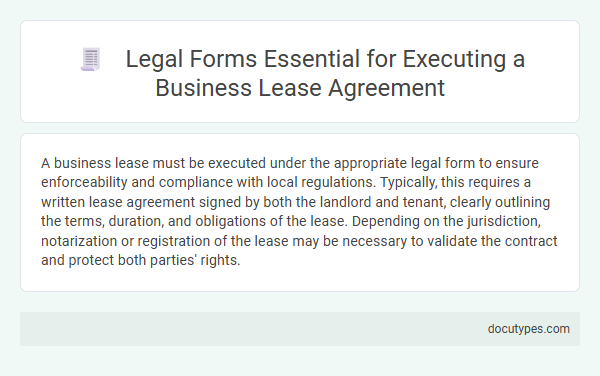A business lease must be executed under the appropriate legal form to ensure enforceability and compliance with local regulations. Typically, this requires a written lease agreement signed by both the landlord and tenant, clearly outlining the terms, duration, and obligations of the lease. Depending on the jurisdiction, notarization or registration of the lease may be necessary to validate the contract and protect both parties' rights.
Introduction to Business Lease Agreements
Understanding the legal form required for executing a business lease is essential for establishing a valid and enforceable contract. Business lease agreements define the terms, rights, and obligations between landlords and tenants in commercial properties.
These agreements must comply with local laws and regulations to protect both parties involved. Your business lease should clearly specify the legal structure under which the lease is executed to avoid future disputes.
Importance of Legal Forms in Lease Transactions
Understanding the required legal form for executing a business lease is crucial for ensuring enforceability and protecting both parties' rights. Proper legal documentation formalizes the lease agreement and mitigates potential disputes.
- Written Lease Agreement - Most jurisdictions mandate a written lease for business properties exceeding one year to comply with the Statute of Frauds.
- Notarization and Witnessing - Some leases require notarization or witnesses to validate the authenticity of signatures and prevent fraud.
- Inclusion of Essential Terms - The lease must specify key elements such as lease duration, rent amount, and responsibilities to be legally binding.
Adhering to the proper legal form is fundamental to safeguarding interests and ensuring the lease withstands judicial scrutiny.
Letter of Intent for Commercial Leasing
Executing a business lease typically requires a formal legal agreement, with the Letter of Intent (LOI) serving as a preliminary document that outlines the key terms and conditions of the commercial leasing arrangement. The LOI is not a binding contract but sets the foundation for the final lease agreement, ensuring that both parties understand their rights and obligations. You should use a carefully drafted LOI to clarify essential details such as rent, lease duration, and responsibilities before proceeding to the full commercial lease contract.
Standard Business Lease Agreement Template
| Legal Form Requirement | A standard business lease agreement must be in writing to be legally enforceable. This written contract outlines the terms and conditions under which the landlord leases commercial property to the tenant. |
|---|---|
| Essential Elements | The lease should include parties' full names, property description, lease term, rent amount, payment schedule, maintenance responsibilities, and termination clauses. |
| Standard Business Lease Agreement Template | Using a well-structured template ensures all necessary legal provisions are addressed, reducing the risk of disputes. A template includes clear language on lease obligations, default consequences, and renewal options. |
| Signing Requirements | The agreement must be signed by authorized representatives of both landlord and tenant. Electronic signatures are often acceptable if compliant with electronic signature laws. |
| Legal Compliance | The lease must comply with local real estate laws, zoning regulations, and commercial leasing statutes. It is advisable to consult legal counsel to review Your lease agreement before execution. |
Personal Guarantee Form
A personal guarantee form is often required when executing a business lease to provide additional security for the landlord. This legal document holds an individual personally responsible for the lease obligations if the business entity defaults.
The form typically includes details about the guarantor's financial commitments and liabilities. Landlords use personal guarantees to reduce risk and ensure lease compliance beyond the business's creditworthiness.
Rent Payment Schedule and Receipt Forms
A business lease must be executed in a written legal form to ensure enforceability and clarity of terms. The lease agreement should explicitly state the rent payment schedule and specify acceptable receipt forms for all transactions.
Rent payment schedules typically outline monthly, quarterly, or annual due dates tailored to the lease duration and business needs. Receipts serve as legal proof of payment and must include details such as the amount paid, payment date, payer information, and lease reference. Proper documentation protects both landlord and tenant from disputes and supports compliance with commercial leasing laws.
Disclosure and Compliance Documents
Executing a business lease requires proper legal form, typically a written contract signed by all parties involved. Disclosure and compliance documents, such as zoning certificates and environmental reports, must be reviewed to ensure adherence to local and state regulations. Failure to provide or obtain these documents can invalidate the lease or lead to legal disputes.
Sublease and Assignment Forms
What legal form is required for executing a business lease, specifically for sublease and assignment forms? A written agreement is essential to ensure the terms are clear and legally enforceable. Sublease and assignment forms must comply with the original lease provisions and local landlord-tenant laws to protect your interests.
Termination and Renewal Agreement Forms
Executing a business lease requires specific legal forms to effectively manage termination and renewal agreements. These forms ensure clarity in rights and obligations between landlords and tenants, reducing potential disputes.
Termination and renewal agreement forms must comply with state and local laws governing commercial leases. Proper documentation helps protect both parties by clearly outlining conditions for ending or extending the lease term.
- Termination Notice Form - Official document notifying the landlord or tenant of intent to terminate the lease as per lease conditions or statutory requirements.
- Renewal Agreement Form - Legal contract that outlines terms for extending the business lease, including rent adjustments and duration of the new term.
- Mutual Release Agreement - Optional form used to formally release both parties from further obligations upon lease termination or renegotiation.
What Legal Form Is Required for Executing a Business Lease? Infographic

